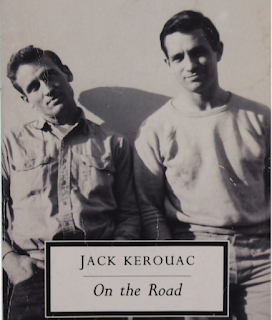I’ve explored America, my country.
My explorations on my own started in the 1980s and continue to this day. I say “on my own” to differentiate from the travels with my family in the 1970s and early 1980s which too are part of my journeys.
I’ve been aware of it for decades, but having not read it, it had no overt influence on my extensive wanderings.
On the Road chronicles Kerouac’s travels with his gang of friends from 1947 to 1950. In some ways it’s a love letter to and about his friend Neal Cassady who appears as Dean Moriarty in the book. All of the names were changed and the book is sold as fiction though it’s very much based on real life events.
I was so wanting to love this book and I so didn’t. And yet, I am glad to have finally read it as it’s considered one of the great American novels and my own life has been driven by the impulses that drove Kerouac and his friends--to see new places, meet new people, and seek adventures.
Yet all in all, my adventures are somewhat tame compared to those of Kerouac and company.
The men whore around--with Cassady/Moriarty in particular leaving babies in his wake with multiple women. Kerouac shacks up with a young Mexican mother for a short period and then summarily moves on leaving her only with the memories of their short affair. The book is wildly politically incorrect from a 2021 perspective--though that aspect alone wasn’t why I didn’t like it.
It was probably the seediness that rubbed me the wrong way--yet that’s what the book is so the fact that I don’t like that aspect of it says as much or more about me than the book. But the junkies and criminals that were Kerouac's friends, and the madness of Cassady/Moriarty . . . ugh. And it was relentless.
Some things I did like:
Kerouac’s narrative style--it still feels fresh today, 64 years after it was published
The descriptions of traveling in America in the late 1940s, pre-interstate highways and on a shoestring budget
The joie de vivre of it, even though it’s seedy and sad, it is meant to be a celebration of an enthusiasm for life and that comes through in a way that defines and carries the narrative
It’s a love letter to America, flaws and all
I was two-thirds through Joyce Johnson’s memoir Minor Characters, when I set it aside to dive into On the Road. I’ll be finishing Johnson’s book for sure. She dated Kerouac in 1957, the year On the Road was released and she knew a lot of the main characters. Her book's title is in reference to herself, as she, and all of the women then, were minor characters for the men who led the Beat movement.
Her book sparked me into a mini-self education into Kerouac and his Beat writer friends who created a literary counter-culture movement in the 1950s. I was truly appalled to find out that two of these luminaries are actual murderers: William Burroughs who shot his wife in the head, killing her instantly and served no time for it, and Lucien Carr who stabbed David Kammerer to death and got only two years because it was allegedly done to stop Kammerer’s homosexual advances on Carr. On top of that Burroughs is a junkie (which he was quite open about and heavily informed his writing--it also seems to have contributed to his murder of his wife).
I had heard of these people before but hadn’t ever taken a deep dive into them and their worlds. Between finishing On the Road and reading Johnson’s memoir, combined with lots of internet searches to get more of the background of the Beat gang, it’s maybe not a deep dive, but it’s been an interesting swim.
On the Road has many memorable descriptive gems of people, places, and broadly the human condition. Also, countercultures are important to the overall well being of the broader culture. These contribute to making this book an important part of the canon of American literature.
I am glad to have finally read Kerouac’s book, even if it was somewhat darker than I was expecting. And I do recommend that people go on the road themselves to expand their understanding of the world beyond their own backyards--whether or not they read On the Road.
